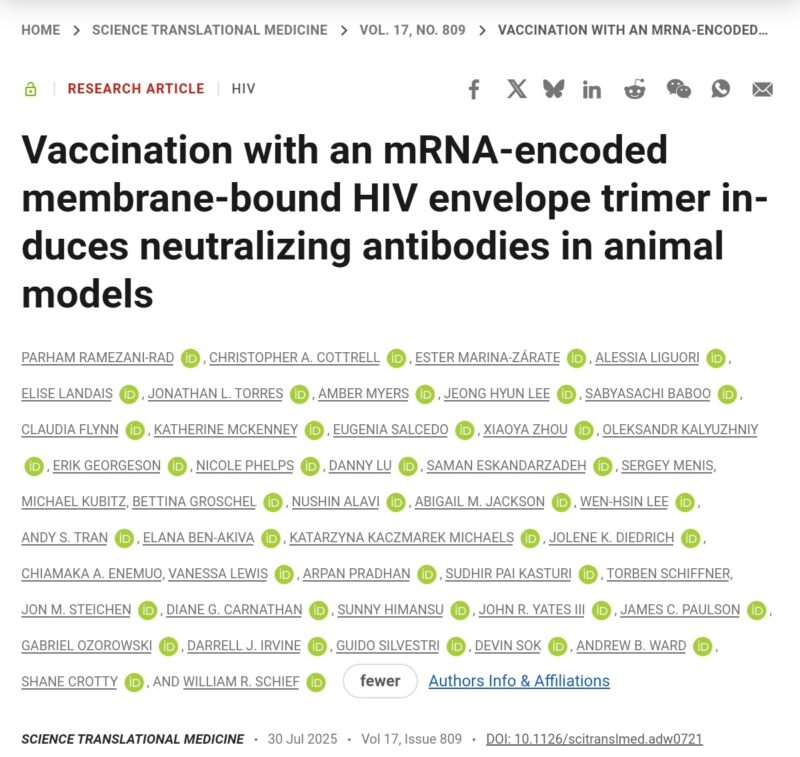Hung Trinh, Senior VP of Operations at Seneca Therapeutics, shared a post on LinkedIn about a paper by Parham Ramezani-Rad et al. published in Science Translational Medicine:
“Vaccination with an mRNA-encoded membrane-bound HIV envelope trimer induces neutralizing antibodies in animal models
A protective vaccine against human immunodeficiency virus (HIV) will likely need to induce broadly neutralizing antibodies (bnAbs) that engage relatively conserved epitopes on the HIV envelope glycoprotein (Env) trimer.
Nearly all vaccine strategies to induce bnAbs require the use of complex immunization regimens involving a series of different immunogens, most of which are Env trimers. Producing protein-based clinical material to evaluate such relatively complex regimens in humans presents major challenges in cost and time.
Furthermore, immunization with HIV trimers as soluble proteins induces strong non neutralizing responses to the trimer base, which is normally occluded on the virion.
These base responses could potentially detract from the elicitation of nAbs and the eventual induction of bnAbs. mRNA vaccine platforms offer potential advantages over protein delivery for HIV vaccine development, including increased production speed, reduced cost, and the ability to deliver membrane-bound trimers that might facilitate improved immuno-focusing to nonbase epitopes.
We report the design of mRNA-delivered soluble and membrane-bound forms of a stabilized native-like Env trimer (BG505 MD39.3); initial immunogenicity evaluation in rabbits that triggered clinical evaluation; and more comprehensive evaluation of B cell, T cell, and antibody responses in nonhuman primates. mRNA-encoded membrane-bound Env immunization elicited reduced off-target base-directed Env responses and stronger nAb responses compared with mRNA-encoded soluble Env.
Overall, mRNA delivery of membrane-bound Env appears promising for enhancing B cell responses to subdominant epitopes and facilitating rapid translation to clinical testing, which should assist HIV vaccine development.”
Title: Vaccination with an mRNA-encoded membrane-bound HIV envelope trimer induces neutralizing antibodies in animal models
Authors: Parham Ramezani-Rad, Christopher A. Cottrell, Ester Marina-Zárate, Alessia Liguori, Elise Landais, Jonathan L. Torres, Amber Myers, Jeong Hyun Lee, Sabyasachi Baboo, Claudia Flynn, Katherine McKenney, Eugenia Salcedo, Xiaoya Zhou, Oleksandr Kalyuzhniy, Erik Georgeson, Nicole Phelps, Danny Lu, Saman Eskandarzadeh, Sergey Menis, Michael Kubitz, Bettina Groschel, Nushin Alavi, Abigail M. Jackson, Wen-Hsin Lee, Andy S. Tran, Elana Ben-Akiva, Katarzyna Kaczmarek Michaels, Jolene K. Diedrich, Chiamaka A. Enemuo, Vanessa Lewis, Arpan Pradhan, Sudhir Pai Kasturi, Torben Schiffner, Jon M. Steichen, Diane G. Carnathan, Sunny Himansu, John R. Yates III, James C. Paulson, Gabriel Ozorowski, Darrell J. Irvine, Guido Silvestri, Devin Sok, Andrew B. Ward, Shane Crotty, William R. Schief
You can read the Full Article in Science Translational Medicine.

More posts featuring Hung Trinh on OncoDaily.


